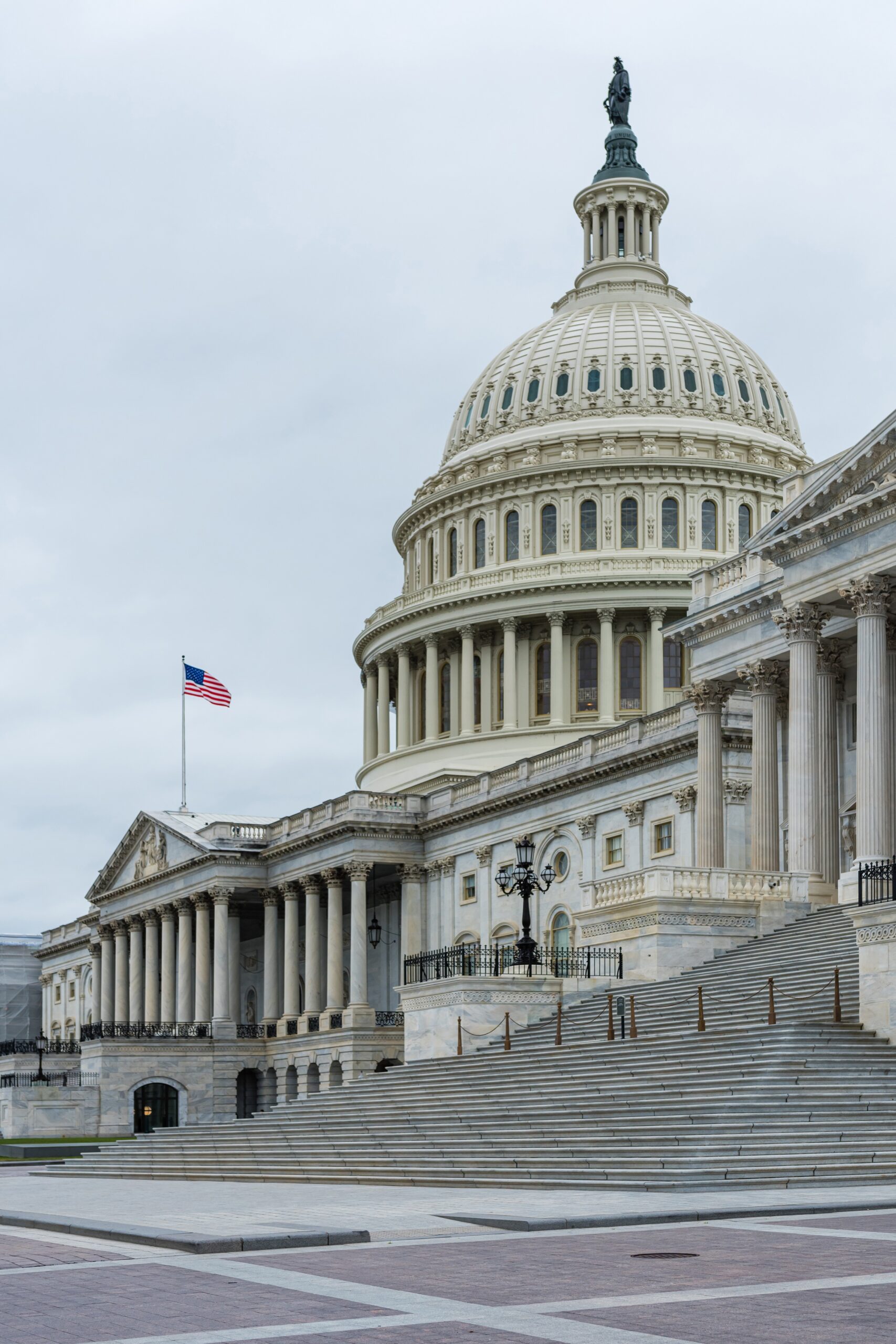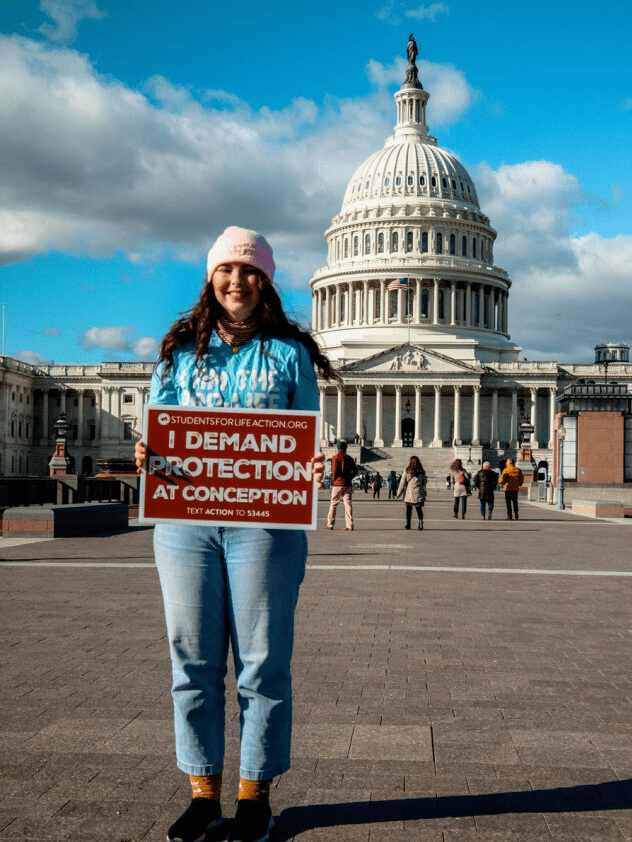
We’ve talked at length previously on the Students for Life Action (SFLAction) blog that we’re not fans of 15-week abortion restriction legislation. Specifically, after the election losses in Virginia and Ohio, our President Kristan Hawkins noted:
“We must demand that Republicans actually join the pro-life movement, not just pay us lip service by saying they are “pro-life” or propose false “compromises” like a 15-Week Abortion Prevention Act, which would allow more than 9 out of 10 abortions to continue and set our movement up for disaster in the long-term as it positions our policy on abortion to the left of France.
We must demand that Republicans get Democrats to admit publicly what we know yet they hide because the vast majority opposes…that they support abortion up until the moment of birth, for any reason.”
As the data shows, more than 9-in-10 abortions occur before 12 weeks, making the 15-week compromise effectively pointless. However, there’s great news – SFLAction has been shepherding and supporting many different pieces of positive, life-affirming legislation that are designed to protect life in a meaningful way.
The top pieces of legislation are summarized below:

HOUSE LEGISLATION
H.R.175 – Heartbeat Protection Act of 2023
What It Does: “This bill makes it a crime for a physician to knowingly perform an abortion (1) without determining whether the unborn child has a detectable heartbeat, (2) without informing the mother of the results, or (3) after determining that a unborn child has a detectable heartbeat.
A physician who performs a prohibited abortion is subject to criminal penalties—a fine, up to five years in prison, or both.
The bill provides an exception for an abortion that is necessary to save the life of a mother whose life is endangered by a physical (but not psychological or emotional) disorder, illness, or condition. It also provides exceptions for certain pregnancies that are the result of rape or incest. A physician who performs or attempts to perform an abortion under an exception must comply with specified requirements.
A woman who undergoes a prohibited abortion may not be prosecuted for violating or conspiring to violate the provisions of this bill.”
Sponsor: Rep. Kelly, Mike [R-PA-16]
Status: Introduced Into House
H.R.6460 – No Taxpayer Abortions for Unaccompanied Minors Act
What It Does: “This bill aims to prevent the Secretary of Health and Human Services from facilitating abortions or access to abortions, including related expenses, for unaccompanied alien children. The bill emphasizes a prohibition on the use of taxpayer funds for these purposes.”
Sponsor: Rep. Brecheen, Josh [R-OK-2]
Status: Introduced Into House
H.R.431 – Life at Conception Act
What It Does: “This bill declares that the right to life guaranteed by the Constitution is vested in each human being at all stages of life, including the moment of fertilization, cloning, or other moment at which an individual comes into being.
Nothing in this bill shall be construed to authorize the prosecution of any woman for the death of her unborn child.”
Sponsor: Rep. Mooney, Alexander X. [R-WV-2]
Status: Introduced Into House
H.R.632 – Ensuring Accurate and Complete Abortion Data Reporting Act of 2023
What It Does: “This bill requires states, as a condition of federal payment under Medicaid for family planning services, to report certain abortion data to the Centers for Disease Control and Prevention (CDC). (Currently, reporting is voluntary.) The CDC must develop standardized questions for states with respect to specified variables (e.g., maternal demographics and methods of abortion).”
Sponsor: Rep. Norman, Ralph [R-SC-5]
Status: Introduced Into Senate
H.R.5806 – Ending Chemical Abortions Act of 2023
What It Does: Introduced in partnership with Students for Life Action’s government affairs team, this bill prohibits the sale, use, and distribution of dangerous Chemical Abortion drugs. It enacts strong penalties for the purveyors of these deadly pills, targeting the predatory abortion industry and their efforts to normalize DIY abortions by shipping dangerous drugs to women by mail.
Sponsor: Rep. Ogles, Andrew [R-TN-5]
Status: Introduced Into House
H.R.435 – Protecting Life on College Campus Act of 2023
What It Does: “This bill prohibits the award of federal funds to an institution of higher education (IHE) that hosts or is affiliated with a school-based service site that provides abortion drugs or abortions to its students or to employees of the IHE or the site. An IHE that hosts or is affiliated with a site must, in order to remain eligible for federal funds, annually certify that the site does not provide abortion drugs or abortions to students or employees.”
Sponsor: Rep. Roy, Chip [R-TX-21]
Status: Introduced Into House
H.R.5577 – FACE Act Repeal Act of 2023
What It Does: “This bill repeals provisions of federal criminal law that prohibit conduct intended to injure, intimidate, or interfere with persons who are seeking to obtain or provide reproductive health services.”
Sponsor: Rep. Roy, Chip [R-TX-21]
Status: Introduced Into House
H.R.7 – No Taxpayer Funding for Abortion and Abortion Insurance Full Disclosure Act of 2023
What It Does: “This bill modifies provisions relating to federal funding for, and health insurance coverage of, abortions. Specifically, the bill prohibits the use of federal funds for abortions or for health coverage that includes abortions. Such restrictions extend to the use of funds in the budget of the District of Columbia. Additionally, abortions may not be provided in a federal health care facility or by a federal employee.
Historically, language has been included in annual appropriations bills for the Department of Health and Human Services (HHS) that prohibits the use of federal funds for abortions—such language is commonly referred to as the Hyde Amendment. Similar language is also frequently included in appropriations bills for other federal agencies and the District of Columbia. The bill makes these restrictions permanent and extends the restrictions to all federal funds (rather than specific agencies).
The bill’s restrictions regarding the use of federal funds do not apply in cases of rape, incest, or where a physical disorder, injury, or illness endangers a woman’s life unless an abortion is performed. The Hyde Amendment provides the same exceptions.
The bill also prohibits qualified health plans from including coverage for abortions. Currently, qualified health plans may cover abortion, but the portion of the premium attributable to abortion coverage is not eligible for subsidies.”
Sponsor: Rep. Smith, Christopher H. [R-NJ-4]
Status: Introduced Into House
H.R.6459 – No Abortion Coverage for Medicaid Act
What It Does: “This bill seeks to amend Title XI of the Social Security Act to impose limitations on demonstration projects related to abortion under Medicaid and the Children’s Health Insurance Program (CHIP). It will restrict the approval of demonstration projects under Medicaid and CHIP that involve federal financial assistance for abortion, with specified exceptions. The bill aligns with the principles of the Hyde Amendment, which has historically limited the use of taxpayer funds for abortion services.”
Sponsor: Rep. Brecheen, Josh [R-OK-2]
Status: Introduced Into House
H.R.371 – Defund Planned Parenthood Act of 2023
What It Does: “This bill restricts federal funding for Planned Parenthood Federation of America Inc. or any of its affiliates or clinics for one year.
Specifically, it prohibits funding those entities unless they certify that the affiliates and clinics will not perform, and will not provide funds to entities that perform, abortions during that year. If the certification requirement is not met, the Department of Health and Human Services and the Department of Agriculture must recoup any federal assistance received by those entities.
However, the bill’s funding restriction does not apply to abortions performed in cases of rape or incest or when necessary to resolve a physical condition that endangers a woman’s life.
The bill also provides additional funding for community health centers for the one-year period. These funds are subject to the same abortion-related restrictions and exceptions.”
Sponsor: Rep. Fischbach, Michelle [R-MN-7]
Status: Introduced Into House

SENATE LEGISLATION
S.750 – No Taxpayer Funding for Health Centers Providing Abortion Act
What It Does: “This bill prohibits grants that are awarded by the Health Resources and Services Administration through the Health Center Program from being used to provide an abortion unless the abortion is necessary to save the life of the mother. (The Health Center Program supports the operations and activities of health centers that primarily provide preventative and primary care to low-income individuals and other medically underserved populations.)”
Sponsor: Sen. Lee, Mike [R-UT]
Status: Introduced Into Senate
S.95 – SAVE Moms and Babies Act of 2023
What It Does: “This bill prohibits the Food and Drug Administration (FDA) from approving any new drug (either as a brand-name drug or a generic) intended to terminate a pregnancy and imposes additional restrictions on such drugs that are already approved.
Under the bill, an already-approved drug intended to terminate a pregnancy may be dispensed to a patient only with a prescription. Furthermore, the FDA may not approve any labeling change that would authorize (1) using the drug after 70 days of gestation, or (2) dispensing the drug by any means other than in-person administration by the prescribing health care practitioner.
The FDA must also impose additional restrictions on such already-approved drugs, including by (1) requiring the prescribing health care practitioner to receive a special certification, (2) prohibiting the practitioner from also acting as the dispensing pharmacist, and (3) requiring the practitioner to have the ability to provide surgical intervention to the patient.
The bill also rescinds any investigational use exemption already granted to such a drug if the bill would have prohibited the FDA from granting the exemption. (Currently, the FDA may grant an exemption to certain market approval requirements if a drug is intended solely for use in safety and effectiveness investigations.)”
Sponsor: Sen. Hyde-Smith, Cindy [R-MS]
Status: Introduced Into Senate
S.204 – Born-Alive Abortion Survivors Protection Act
What It Does: “This bill establishes requirements for the degree of care a health care practitioner must provide in the case of a child born alive following an abortion or attempted abortion.
Specifically, a health care practitioner who is present must (1) exercise the same degree of care as would reasonably be provided to any other child born alive at the same gestational age, and (2) ensure the child is immediately admitted to a hospital. Additionally, a health care practitioner or other employee who has knowledge of a failure to comply with the degree-of-care requirements must immediately report such failure to law enforcement.
A health care practitioner who fails to provide the required degree of care, or a health care practitioner or other employee who fails to report such failure, is subject to criminal penalties—a fine, up to five years in prison, or both.
An individual who intentionally kills or attempts to kill a child born alive is subject to prosecution for murder.
The bill bars the criminal prosecution of a mother of a child born alive under this bill and allows her to bring a civil action against a health care practitioner or other employee for violations.”
Sponsor: Sen. Thune, John [R-SD]
Status: Introduced Into Senate
What It Does: “This bill aims to amend Title 40 of the United States Code to prohibit the Administrator of General Services from making decisions about constructing or acquiring public buildings or entering into leases based on the legality or availability of abortion. The bill emphasizes that in the acquisition, construction, alteration, leasing, and lease agreements related to public buildings and properties, the Administrator should not take into consideration the legality or availability of abortion.
The proposed amendments affect specific sections of Title 40, including Section 3304 regarding the acquisition of buildings and sites, Section 3305 regarding the construction and alteration of buildings, Section 1302 regarding the lease of buildings, and Section 585 regarding lease agreements. The bill aims to separate decisions about federal buildings and properties from considerations related to abortion legality or availability.”
Sponsor: Sen. Marshall, Roger [R-KS]
Status: Introduced Into Senate
S.959 – Stopping Traffickers and Their Accomplices Act of 2023
What It Does: “This bill requires an abortion provider to notify the National Human Trafficking Hotline if the provider has a reasonable suspicion that a patient is a victim of trafficking. It also requires each abortion provider to require its employees to complete annual training on how to identify and respond appropriately to individuals who are at risk of or who have experienced trafficking. The bill establishes penalties for violations.”
Sponsor: Sen. Budd, Ted [R-NC]
Status: Introduced Into Senate
S.1102 – Dignity for Aborted Children Act
What It Does: “This bill sets out requirements for the disposition of human fetal tissue from an abortion. Specifically, it requires abortion providers to obtain a patient’s informed consent for one of two specified methods of disposition.
First, patients may choose to retain possession of the tissue. A patient may choose to transfer the tissue to an entity that provides interment or cremation services.
Second, the patient may elect to release the tissue to the provider. Providers must ensure any tissue released to them is interred or cremated within seven days of the procedure in a manner consistent with state law regarding the disposal of human remains. Abortion providers must report annually about these requirements and other specified information.
The bill provides civil or criminal penalties for violations of disposal, informed consent, and reporting requirements.”
Sponsor: Sen. Braun, Mike [R-IN]
Status: Introduced Into Senate
S.471 – Women’s Public Health and Safety Act
What It Does: “This bill allows a state to exclude from participation in the state’s Medicaid program a provider that performs an abortion, unless (1) the pregnancy is the result of rape or incest, or (2) the woman suffers from a physical issue that would place her in danger of death unless an abortion is performed. Under current law, a state plan for medical assistance must provide that any individual eligible for medical assistance may obtain required services from any provider qualified to perform them.”
Sponsor: Sen. Lankford, James [R-OK]
Status: Introduced Into Senate
S.13 – Protect Funding for Women’s Health Care Act
What It Does: “This bill prohibits federal funding of Planned Parenthood Federation of America or its affiliates, subsidiaries, successors, or clinics.”
Sponsor: Sen. Ernst, Joni [R-IA]
Status: Introduced Into Senate
Other bills that we have supported and are monitoring for passage include:
- Mothers and Infants Financial Security Act – Vance, J. D. [Sen.-R-OH]
- Love Them Both Act – Miller, Mary E. [Rep.-R-IL-15]
- Pregnancy Is Not an Illness Act of 2023 – Miller, Mary E. [Rep.-R-IL-15]
- Women’s Right To Know Act of 2023 – Miller, Mary E. [Rep.-R-IL-15]
